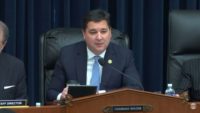Days after the Biden administration rule reinstated state authority under the U.S. Clean Water Act to delay or deny construction permits on projects with water quality impacts, attorneys general from 11 Republican-led states, along with the American Petroleum Association, National Hydropower Association and Interstate Natural Gas Association of America, filed suit in federal court.
The law's Section 401 Water Quality Improvements Rule was finalized by the U.S. Environmental Protection Agency and U.S. Army Corps of Engineers in September and took effect Nov. 27. EPA said it reinstated traditional state authority to delay or halt projects or place conditions on developers to obtain the water quality certification permit under the law.
But for the first time, the agency also gave states just one year to review a project proposal to avoid unnecessary permit delay.
The complaint, filed Dec. 4 in the U.S. District Court in Shreveport, La., contends that EPA exceeded its authority by allowing states to deny water quality certifications that are not related to their impact on waters considered to be “Waters of the United States,” or WOTUS.
The litigants say a 2020 water quality rule finalized by the Trump administration, which narrowed state authority to deny or place conditions on Section 401 permits, hews more closely to the law's intent. They argue that states should focus only on discharges into federal waters, not a project’s overall impact on those waters, including downstream environmental effects.
Additionally, the three associations say they each have multiple member firms that submitted Section 401 certification requests after the 2020 rule went into effect, but before the 2023 revision was enacted. Many of those requests have been in limbo and now are subject to the more stringent mandates, they contend.
The hydropower group claims in the complaint that it has one member firm that has three hydroelectric projects with pending certification requests. "Given that this member submitted its Section 401 certification request while the 2020 Rule was legally operative, this member appropriately tailored its requests to that rule, expending significant resources" to do so. "Now, however, the certifying states must evaluate the requests," the member, described as a dam owner, must comply with a more stringent standard than the one that existed when it previously submitted the request, the group argues.
States frequently exercise their authority to require developers to modify projects for continued licenses, or in the case of hydroelectric dams, to protect water quality.
A notable example is the continuing saga over the Conowingo Dam in Maryland. Owner Constellation Energy attempted to renew the hydroelectric dam's 50-year license from the Federal Energy Regulatory Commission in 2018, but the state refused to issue a water certification needed for that process to move forward without structural modifications to reduce environmental impacts on the Chesapeake Bay.
Following several years of legal battle between environmental groups and Constellation Energy, FERC is issuing one-year license renewals as Maryland's Dept. of Environmental Quality restarts its water certification process.
Legal Outlook
Larry Liebesman, a former trial attorney in the U.S. Justice Dept. Environment and Natural Resources Division, says “it’s going to be tough” for the litigants to succeed in a legal challenge.
In issuing the rule, EPA said it was reverting to well-established interpretations of the clean water law and used a 1994 ruling by the U.S. Supreme Court as a strong legal basis for that interpretation, says Liebesman, now a senior advisor at environmental consulting firm Dawson & Associates.
But Liebesman also noted, that with a January date set for oral argument in a Supreme Court case that will review legal underpinning of the Chevron doctrine—established in the 1984 Chevron v. Natural Resources Defense Council decision—which provides broad deference to federal agencies to interpret U.S. laws, it is possible the high court could also potentially choose to take a closer look at EPA’s rationale behind the Section 401 rule, if the case ever reaches the justices.
“I think that could happen, but … you’re dealing with interpretation of the law that the Supreme Court has upheld and which has historically been implemented for several years.”





